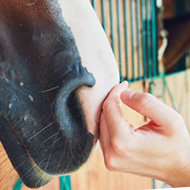Support for horse welfare during COVID-19

"The coronavirus pandemic has caused immense difficulties for many areas across the equestrian industry."
A Hardship Fund to support the welfare of horses and ponies during the COVID-19 pandemic has been launched by the British Horse Society (BHS).
The Fund is specifically aimed to help BHS-approved riding schools who have been financially impacted by the outbreak and is designed to support any costs that go towards the health and wellbeing of equines under their care.
Each school has been allocated a payment of £750, made possible by contributions from BHS National, Regional and County Committees. The BHS has also been able to access several of their restricted funds, held aside for welfare specific purposes.
“The coronavirus pandemic has caused immense difficulties for many areas across the equestrian industry and riding schools have been hit particularly hard,” said James Hick, chief executive officer at The British Horse Society. “As their income stopped on March 23rd but the need to look after the wellbeing of horses continues at a high cost.
“The welfare of horses is at the heart of everything the BHS does, and we are working incredibly hard to help support our Approved Ridings Schools through these unsettling times. We hope that this Hardship Fund will help alleviate some of the financial strain riding schools are currently facing, whilst also serving to protect the health and wellbeing of the horses and ponies under their care.”
In addition to the Hardship Fund, the BHS has pledged to waiver all approved centre membership fees for the next 12 months and will be launching a donations appeal in the coming weeks to help provide further support.
The BHS has contacted its approved riding schools with details on how to apply for the funding. Schools that have not yet received communication are encouraged to contact the BHS Approvals team approvals@bhs.org.uk or call 024768 40500.



 The RCVS has announced a new version of its 1CPD mobile app, with enhanced features for veterinary surgeons and veterinary nurses to record their continuing professional development.
The RCVS has announced a new version of its 1CPD mobile app, with enhanced features for veterinary surgeons and veterinary nurses to record their continuing professional development.